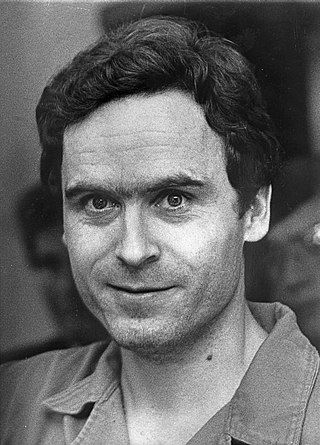Crime in Washington may refer to:
Crime in Washington may refer to:
Hardcore, hard core or hard-core may refer to:

The D.C. sniper attacks were a series of coordinated shootings that occurred during three weeks in October 2002 throughout the Washington metropolitan area, consisting of the District of Columbia, Maryland, and Virginia, and preliminary shootings, that consisted of murders and robberies in several states, and lasted for six months starting in February 2002. Seven people were killed, and seven others were injured in the preliminary shootings, and ten people were killed and three others were critically wounded in the October shootings. In total, the snipers killed 17 people and wounded 10 others in a 10-month span.

Theodore Robert Bundy was an American serial killer who kidnapped, raped and murdered dozens of young women and girls during the 1970s and possibly earlier. After more than a decade of denials, he confessed to 30 murders committed in seven states between 1974 and 1978. His true victim total is unknown.

Constantino Paul Castellano was an American crime boss who succeeded Carlo Gambino as head of the Gambino crime family of New York City. Castellano ran the organization from 1976 until his unsanctioned assassination on December 16, 1985.

Mary Katherine "Mary Kay" Fualaau, was an American sex offender and teacher who pleaded guilty in 1997 to two counts of felony second-degree rape of a child. Letourneau was 34, and the child, Vili Fualaau, was 12 years old when she initiated their sexual relationship. He was her sixth-grade student at an elementary school in Burien, Washington. While awaiting sentencing, she gave birth to Fualaau's daughter. With the state seeking a 7.5 year prison sentence, she reached a plea agreement calling for six months in jail with three months suspended and no contact with Fualaau for life, among other terms. The case received national attention.
ICT may refer to:

The Violent Crime Control and Law Enforcement Act of 1994, commonly referred to as the 1994 Crime Bill, or the Clinton Crime Bill, is an Act of Congress dealing with crime and law enforcement; it became law in 1994. It is the largest crime bill in the history of the United States and consisted of 356 pages that provided for 100,000 new police officers, $9.7 billion in funding for prisons which were designed with significant input from experienced police officers. Sponsored by U.S. Representative Jack Brooks of Texas, the bill was passed by Congress and signed into law by President Bill Clinton. Then-Senator Joe Biden of Delaware drafted the Senate version of the legislation in cooperation with the National Association of Police Organizations, also incorporating the Assault Weapons ban and the Violence Against Women Act (VAWA) with Senator Orrin Hatch.

James Byrd Jr. was an African American man who was murdered by three white men, two of whom were avowed white supremacists, in Jasper, Texas, on June 7, 1998. Shawn Berry, Lawrence Brewer, and John King dragged him for three miles behind a Ford pickup truck along an asphalt road. Byrd, who remained conscious for much of his ordeal, was killed about halfway through the dragging when his body hit the edge of a culvert, severing his right arm and head. The murderers drove on for another 1+1⁄2 miles before dumping his torso in front of a Black church.

Gary Leon Ridgway is an American serial killer known as the Green River Killer. He was initially convicted of 48 separate murders committed between the early 1980s and late 1990s. As part of his plea bargain, another conviction was added, bringing the total number of convictions to 49, making him the second most prolific serial killer in United States history according to confirmed murders.
Triad or triade may refer to:
NCIS or N.C.I.S. may refer to:
Ann Rae Rule was an American author of true crime books and articles.
Unforgettable may refer to:
Timothy is a masculine name. It comes from the Greek name Τιμόθεος (Timόtheos) meaning "honouring God", "in God's honour", or "honoured by God". Timothy is a common name in several countries.
Crime rates in the state of Washington grew rapidly to large levels from 1960 to 1980, however slowed in growth from 1980 onward. Although the cause of this drop in crime growth from the 1980s cannot be directly determined, it was believed to have been a result from several law enforcement initiatives & policies implemented throughout the state of Washington and across the United States, such as abortion access.
The Seattle crime family, also known as the Colacurcio crime family or Seattle Mafia, is a crime family based in Seattle, Washington.

Hands Across Hawthorne was a rally held at the Hawthorne Bridge in the American West Coast city of Portland, Oregon, on May 29, 2011. The demonstration was in response to an attack, one week earlier, on Brad Forkner and Christopher Rosevear, a gay male couple who had been holding hands while walking across the bridge. According to the couple and the Portland Police Bureau, a group of five men followed Forkner and Rosevear along the bridge before physically assaulting them. The assault was condemned by Portland's mayor, Sam Adams, and its police chief, Mike Reese, and news of the attack spread throughout the Pacific Northwest and the United States. The attack prompted volunteers from the Q Center, a nonprofit organization that supports the LGBT community, to form street patrols as a means of monitoring Portland's downtown area.

Donald Trump, the 45th president of the United States, addressed a joint session of the United States Congress on Tuesday, February 28, 2017. It was his first public address before a joint session. Similar to a State of the Union Address, it was delivered before the 115th United States Congress in the Chamber of the House of Representatives in the United States Capitol. Presiding over this joint session was the House speaker, Paul Ryan, accompanied by Mike Pence, the vice president in his capacity as the president of the Senate.

In the United States, "defund the police" is a slogan that supports removing funds from police departments and reallocating them to non-policing forms of public safety and community support, such as social services, youth services, housing, education, healthcare and other community resources. Activists who use the phrase may do so with varying intentions; some seek modest reductions, while others argue for full divestment as a step toward the abolition of contemporary police services. Activists who support the defunding of police departments often argue that investing in community programs could provide a better crime deterrent for communities; funds would go toward addressing social issues, like poverty, homelessness, and mental disorders. Police abolitionists call for replacing existing police forces with other systems of public safety, like housing, employment, community health, education, and other programs.